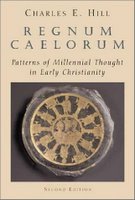Regnum Caelorum
 Patterns of Millennial Thought in Early Christianity, 2nd Edition
Patterns of Millennial Thought in Early Christianity, 2nd EditionC. E. Hill
Welcome to my theological blog page. The title Regnum Caelorum, meaning "kingdom of heaven," is taken from an excellent book written by one of my professors about the history and development of millennial thought in the early church. Hill's argument is that, despite popular opinion, there were many in the early church (particularly from the late first to third centuries) that were not "chiliasts" (or premillennialists by today's terminology). These non-chiliasts can be identified because they believed in a heavenly afterlife, as opposed to their chiliast bretheren, all of which believed they would rest in Hades after death. In fact, reading his book makes one believe that chiliasm was a development in early Christianity around the middle of the second century. I highly recommend it to those interested in the history of eschatology in the early church. For an overview of Hill's argument (both in this book and in a couple articles), click here.
However, I'm intending that the subject of this blog page to be substantially broader than that of the book. Instead of being concerned with particular millennial views, I intend to this blog to be a forum of discussion concerning what the church would look like if we consistently believed in covanental and reformed understandings of the kingdom of God and redemptive history. What is the kingdom of heaven like, and how are we to live in it? These are questions that I believe we need to ask ourselves, and I believe the answers will challenge the church to live in the world differently. We would give our lives in service and mercy to the least of these in our communities and around the world so that the gospel of the King who "came not to be served, but to serve, and to give his life as a ransom for many" might be seen in the life of His Church, His body, His kingdom on earth, until He returns.

.jpg)
Comments
Eschatology and Pain in St. Gregory the Great
The Christological Synthesis of Gregory's Morals on the Book of Job